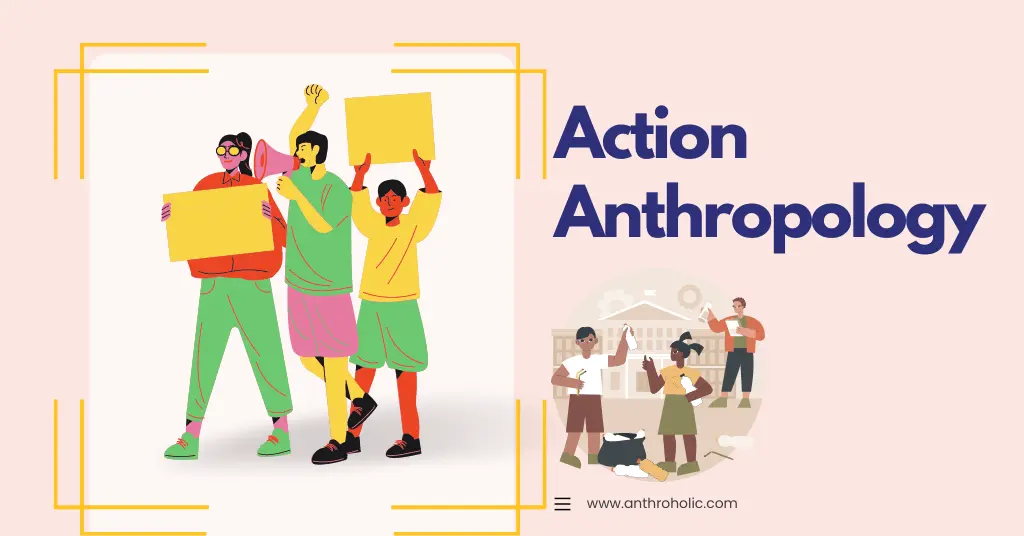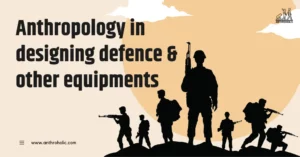AI Answer Evaluation Platform Live Now. Try Free Answer Evaluation Now
Action Anthropology
Action anthropology is an applied branch of anthropology that aims to solve human problems by actively engaging with communities to foster social change. This approach recognizes the importance of collaboration and partnership between anthropologists and the communities they study.

Theoretical Foundations of Action Anthropology
- Emergence of Action Anthropology
- The field emerged in the 1940s as a response to the growing concern for the welfare of indigenous peoples and marginalized communities.
- Sol Tax, an American anthropologist, is considered the founder of action anthropology.
- The primary goal of action anthropology is to create positive social change and empower communities through anthropological research and collaboration.
- Relationship with Other Branches of Anthropology
- Action anthropology shares its roots with applied anthropology, but it has a more active and participatory focus.
- While applied anthropology aims to solve problems using anthropological knowledge, action anthropology goes beyond problem-solving to empower communities to take charge of their own change.
- Action anthropology aligns with critical, reflexive, and participatory branches of anthropology that challenge traditional, hierarchical research models.
Methodologies and Ethical Considerations
- Participatory Action Research (PAR)
- PAR is a collaborative research approach that engages community members as co-researchers and promotes mutual learning.
- PAR emphasizes the importance of local knowledge and community participation in identifying, analyzing, and addressing issues.
- PAR has been widely used in action anthropology projects, as it aligns with the goals of empowerment and social change.
- Ethical Considerations
- Action anthropology requires a strong commitment to ethical principles, including respect for autonomy, non-maleficence, beneficence, and justice.
- Anthropologists must be aware of power dynamics and potential conflicts of interest when working with communities.
- Informed consent, confidentiality, and transparency are essential to ethical action anthropology practice.
Case Studies
- Case Study 1: Navajo Nation and Uranium Mining
- Action anthropologists collaborated with the Navajo Nation to address the harmful effects of uranium mining on their land and people.
- Researchers worked with community members to document health issues, collect environmental data, and raise awareness of the issue.
- This collaborative effort led to the passage of the Dine Natural Resources Protection Act, banning uranium mining on Navajo lands (Diné Policy Institute).
- Case Study 2: Empowering Women in Rural India
- Action anthropologists partnered with rural Indian women to develop a microfinance program and support entrepreneurship.
- The project involved participatory workshops, skill-building sessions, and the creation of women-led self-help groups.
- The program successfully empowered women economically and socially, leading to improved livelihoods and increased decision-making power within their communities (Biswas and Nangia 2019).
- Case Study 3: Indigenous Language Revitalization in Canada
- Action anthropologists worked with First Nations communities in Canada to revitalize endangered indigenous languages.
- The project involved the development of language learning resources, community-based language programs, and advocacy for language preservation.
- This collaborative effort has contributed to the revitalization of several indigenous languages and the strengthening of cultural identity among First Nations peoples (Czaykowska-Higgins 2009
Future Directions
- Global Challenges and Opportunities
- Action anthropology can play a crucial role in addressing global challenges, such as climate change, poverty, and social inequality.
- By collaborating with communities and using participatory methods, action anthropologists can contribute to sustainable, locally driven solutions.
- Technology and Action Anthropology
- The increasing availability of digital tools and platforms offers new opportunities for action anthropologists to engage with communities.
- Online platforms can facilitate communication, data sharing, and collaboration, thus enhancing the participatory process.
- However, anthropologists must also consider the digital divide and potential ethical concerns related to data privacy and security.
- Building Partnerships and Collaboration
- To maximize the impact of action anthropology, it is essential to build strong partnerships between researchers, communities, and other stakeholders.
- Interdisciplinary collaboration can provide new insights and resources to address complex social issues.
- Effective partnerships can also help to ensure the sustainability of action anthropology initiatives, as well as the continued empowerment of communities.
Challenges and Limitations of Action Anthropology
- Balancing Academic and Applied Goals
- Action anthropologists often face the challenge of balancing their academic research goals with the applied objectives of their projects.
- Achieving this balance requires flexibility and a willingness to adapt research methods and priorities to align with the needs and interests of the communities they work with.
- Navigating Power Dynamics and Politics
- Action anthropologists must be aware of power dynamics and political complexities within the communities they engage with, as well as the broader social, political, and economic contexts in which their work takes place.
- This awareness is crucial for maintaining ethical relationships and avoiding the potential for exploitation or unintended harm.
- Sustainability of Initiatives
- Ensuring the long-term sustainability of action anthropology initiatives can be challenging, particularly in situations where resources are limited or external factors change.
- Anthropologists must work closely with communities to develop strategies for sustaining projects and empowering communities to continue the work independently.
Action Anthropology in the Classroom
- Integrating Action Anthropology into Anthropology Curricula
- Incorporating action anthropology into anthropology courses and programs can help students develop practical skills and engage with real-world issues.
- This approach can provide students with valuable hands-on experience and opportunities to apply anthropological theory and methods in a practical context.
- Benefits of Engaging Students in Action Anthropology
- Participating in action anthropology projects can help students develop a deeper understanding of cultural diversity, social inequality, and the potential for anthropological knowledge to contribute to social change.
- Engagement in action anthropology projects can also foster critical thinking, problem-solving, and communication skills, preparing students for careers in academia, non-profit organizations, or other sectors.
Conclusion
Action anthropology provides a powerful framework for engaging with communities and fostering positive social change. By embracing participatory methods, ethical research practices, and a focus on community empowerment, action anthropologists can make meaningful contributions to addressing pressing social issues. The case studies, challenges, and future directions discussed in this article highlight the potential of action anthropology to transform both the discipline and the communities it serves.
References
- Biswas, Anindita, and Parul Nangia. “Empowerment of Rural Women through Microfinance: A Case Study from India.” Journal of Social and Economic Development, vol. 21, no. 1, 2019, pp. 115-134.
- Czaykowska-Higgins, Ewa. “Research Models, Community Engagement, and Linguistic Fieldwork: Reflections on Working within Canadian Indigenous Communities.” Language Documentation & Conservation, vol. 3, no. 1, 2009, pp. 15-50.
- Diné Policy Institute. The Impact of Uranium Mining on the Navajo People: A Policy Report. Diné College, 2012.
- Harrison, Faye V. Decolonizing Anthropology: Moving Further Toward an Anthropology for Liberation. American Anthropological Association, 2010.
- Nolan, Riall W. Applied Anthropology: Tools and Perspectives for Contemporary Practice. Pearson, 2002.
Works Consulted
- Chambers, Erve. Applied Anthropology: A Practical Guide. Waveland Press, 2013.
- Fisher, William H. “Doing Good? The Politics and Antipolitics of NGO Practices.” Annual Review of Anthropology, vol. 26, 1997, pp. 439-464.
- Tax, Sol. “Action Anthropology.” Human Organization, vol. 2, no. 4, 1943, pp. 1-10.
- Greenwood, Davydd J., and Morten Levin. Introduction to Action Research: Social Research for Social Change. SAGE Publications, 2007.
- Lassiter, Luke Eric. The Chicago Guide to Collaborative Ethnography. University of Chicago Press, 2005.
- Smith, Linda Tuhiwai. Decolonizing Methodologies: Research and Indigenous Peoples. Zed Books, 2012.



